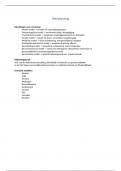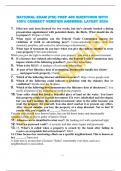Syntaxis semester 2 blok 4
Samenvatting alle tentamenstof (CH6-8)
Week 1 – naamvallen
Er zijn twee soorten naamvalsystemen:
1. accusatiefsystemen = systemen waarbij het object in een transitieve zin gemarkeerd is
2. ergatiefsystemen = systemen waarbij het subject van een transitieve zin gemarkeerd is
Het ‘ongemarkeerde’ argument is nominatief.
Soorten naamvallen:
1. nominatief → subject in NL, en dus ongemarkeerd
2. genitief → bezitter
3. datief → indirect object
4. accusatief → direct object
5. oblique → anders (bijvoorbeeld instrumentalis)
6. ergatief → naamval voor de agens in ergatieve talen
Let op: in talen die zowel een ergatief als een accusatief kennen, daarbij kan de ergatief ook op een
subject van een intransitieve zin voorkomen, met een verschil in interpretatie.
- Ram screamed
- Ram-ERG screamed
Let op: in het Nederlands plaatsen we geen andere naamvallen op het subject, in andere talen kan
dat wel.
- Ram-DAT kreeg een boek
A-Argument = het subject in een transitieve zin
- Hij heeft een hond gekocht
S-Argument = het subject van een intransitieve zin
- Hij loopt in Brabant
O-Argument = het object in een transitieve zin
- Hij heeft jou geroepen
In het Nederlands gedragen A en S zich hetzelfde, dan is het Nederlands een accusatieve taal.
Gedragen S en O zich hetzelfde, dan is die taal ergatief.
A S O
Ergatieve taal
, A S O
Accusatieve taal
Je hoeft ‘NOM’ niet terug te zien in de gloss, want NOM betekent dat het gewoon niet gemarkeerd
is. Dus is er iets ongemarkeerd, dan is het een nominatief.
Week 2 – agreement
Er kan met de volgende argumenten agreement zijn:
1. nominatief argument (met S en O of met S en A)
2. subject
3. object
4. subject en object
Als A en S zich hetzelfde gedragen bij agreement, dan spreken we van een accusatieve taal, en als S
en O zich hetzelfde gedragen bij agreement, dan spreken van een ergatieve taal.
- Bij sommige talen is het van daaruit moeilijker vast te stellen. Het Latijn is bijvoorbeeld een
pro-drop-taal; het pronoun kan worden weggelaten.
Let op: in onderstaand voorbeeld is tõ oblique. Je moet goed kijken naar de vertaling. Het is
namelijk naamval van een adjunct ( by the boy)
Samenvatting alle tentamenstof (CH6-8)
Week 1 – naamvallen
Er zijn twee soorten naamvalsystemen:
1. accusatiefsystemen = systemen waarbij het object in een transitieve zin gemarkeerd is
2. ergatiefsystemen = systemen waarbij het subject van een transitieve zin gemarkeerd is
Het ‘ongemarkeerde’ argument is nominatief.
Soorten naamvallen:
1. nominatief → subject in NL, en dus ongemarkeerd
2. genitief → bezitter
3. datief → indirect object
4. accusatief → direct object
5. oblique → anders (bijvoorbeeld instrumentalis)
6. ergatief → naamval voor de agens in ergatieve talen
Let op: in talen die zowel een ergatief als een accusatief kennen, daarbij kan de ergatief ook op een
subject van een intransitieve zin voorkomen, met een verschil in interpretatie.
- Ram screamed
- Ram-ERG screamed
Let op: in het Nederlands plaatsen we geen andere naamvallen op het subject, in andere talen kan
dat wel.
- Ram-DAT kreeg een boek
A-Argument = het subject in een transitieve zin
- Hij heeft een hond gekocht
S-Argument = het subject van een intransitieve zin
- Hij loopt in Brabant
O-Argument = het object in een transitieve zin
- Hij heeft jou geroepen
In het Nederlands gedragen A en S zich hetzelfde, dan is het Nederlands een accusatieve taal.
Gedragen S en O zich hetzelfde, dan is die taal ergatief.
A S O
Ergatieve taal
, A S O
Accusatieve taal
Je hoeft ‘NOM’ niet terug te zien in de gloss, want NOM betekent dat het gewoon niet gemarkeerd
is. Dus is er iets ongemarkeerd, dan is het een nominatief.
Week 2 – agreement
Er kan met de volgende argumenten agreement zijn:
1. nominatief argument (met S en O of met S en A)
2. subject
3. object
4. subject en object
Als A en S zich hetzelfde gedragen bij agreement, dan spreken we van een accusatieve taal, en als S
en O zich hetzelfde gedragen bij agreement, dan spreken van een ergatieve taal.
- Bij sommige talen is het van daaruit moeilijker vast te stellen. Het Latijn is bijvoorbeeld een
pro-drop-taal; het pronoun kan worden weggelaten.
Let op: in onderstaand voorbeeld is tõ oblique. Je moet goed kijken naar de vertaling. Het is
namelijk naamval van een adjunct ( by the boy)




